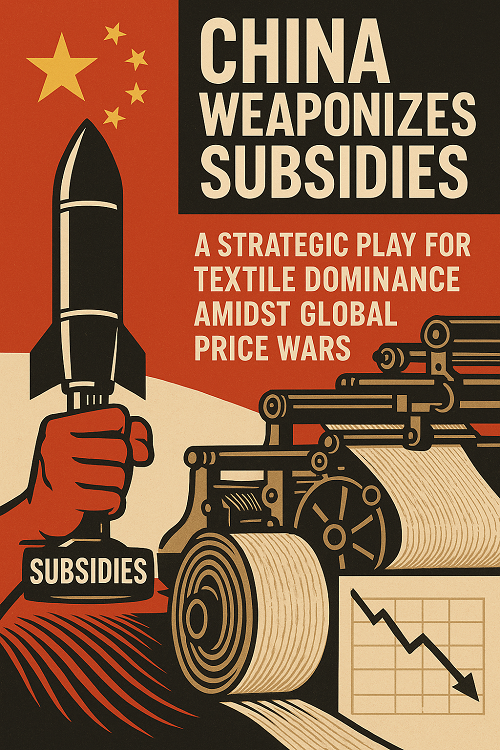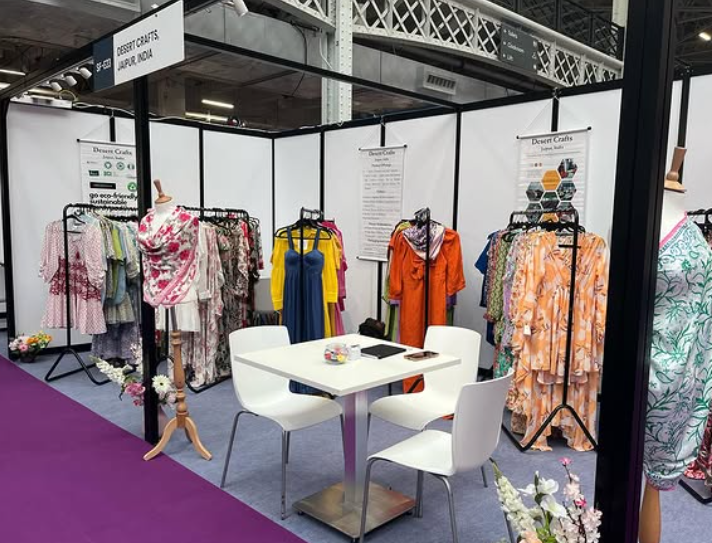Taking a plunge into the world of eco-conscious fashion, California-based swimwear brand Vitamin A is launching its ReLux collection, the first collection made from 100 per cent recycled fabric. Developed by Hyosung and Hung Yen Knitting & Dyeing, this innovative material incorporates repurposed fishing nets and recycled Spandex, offering a sustainable alternative to traditional swimwear textiles.
The launch of ReLux responds to a growing demand for eco-friendly swimwear amongst consumers who are increasingly concerned about the environmental impact of their clothing choices.Highlighting this shift in consumer preferences, Mark Sunderland, Vice President-Product Innovation, Swim USA (Vitamin A's parent company), says, with its ReLux collection, the brand offers a product actively contributes to ocean health."
Founded in 2000 with a commitment to sustainability, Vitamin A has consistently ranked among the top five eco-friendly swimwear brands. The brand’s consistent use of plant-based and recycled materials, local manufacturing in California, and support for ocean conservation organisations like 1 per cent for the Planet strengthen its dedication to environmental responsibility.

The recently concluded Milano Unica, held from January 23rd to 25th, 2024, showcased latest trends, fostering connections, and driving business forward. Here's are the key takeaways.
Strong buyer presence: The event saw a surge in international buyers, indicating renewed confidence in the industry's post-pandemic recovery. "Milano Unica always attracts a diverse and high-quality audience," says Fabio Rivolta, President of the National Chamber of Fashion. "This year, the strong international presence is particularly encouraging, signaling a positive outlook for the future."
Sustainability in focus: Sustainability remained a major theme, with many brands showcasing eco-friendly materials and production processes. "Sustainability is no longer a trend, it's a necessity," stated Elena Salvatelli, CEO of the Candiani denim mill. "We're seeing growing demand for responsible and transparent practices, and Milano Unica provided a platform to highlight our commitment to this."
Digitalization and innovation: Technology played a significant role, with exhibitors showcasing innovative solutions for design, production, and supply chain management. "Digitalization is transforming the industry, and Milano Unica is at the forefront of this change," opined Marco Pietra, CEO of the Italian Textile Machinery Association. "We saw a wide range of exciting new technologies that will improve efficiency and sustainability."
New launches, seminars and workshops
Emerging designers in the spotlight: The "Next Generation" section featured promising young designers, showcasing their innovative approaches and fresh perspectives. "Being part of Next Generation is a fantastic opportunity to gain exposure and connect with potential clients," said Giulia Rossi, a young designer showcased in the section. "The platform provided valuable feedback and allowed me to share my vision with a wider audience."
Seminars and workshops: A packed schedule of seminars, conferences, and workshops covered diverse topics like sustainable practices, digital transformation, and market trends. "The seminars offered valuable insights and helped us stay up-to-date on industry developments," shared Maria Esposito, a buyer. "The mix of topics and speakers was very impressive."
Product trends
Natural fibers and comfort: Fabrics made from natural fibers like linen, cotton, and hemp were prominent, reflecting a growing demand for comfort and sustainability. "We're seeing a shift towards natural fibers that are gentle on the skin and the environment," explained Paolo Colombo, CEO of a leading textile manufacturer. "This trend is driven by consumers' increasing awareness of the impact of their choices."
Bold colors and patterns: While comfort reigns supreme, designers also embraced bold colors and patterns, adding a touch of vibrancy and personality to their collections. "Fashion is about expressing oneself, and this season's trends offer a variety of options for people to showcase their unique style," said Carla Rossi, a fashion trend analyst. "From statement prints to vibrant colors, there's something for everyone."
Functionality and versatility: Clothing with a focus on functionality and versatility was a key trend, catering to consumers' busy lifestyles. "People want clothes that are comfortable, stylish, and practical," noted Marco Bianchi, a retail owner. "This season's collections offer pieces that can easily transition from day to night, making them perfect for modern living."
Milano Unica left participants with valuable insights, new connections, and a renewed sense of optimism for the future of the textile industry. The event's focus on sustainability, innovation, and product evolution promises exciting developments in the months and years to come.
Renowned textile trade show, Texworld made a triumphant return to Paris this year with a record-breaking 1,300 exhibitors and a new two-floor layout.
Organised by Messe Frankfurt France, the trade show changed its name to Texworld –Apparel Sourcing-Paris-reflecting the trend of buyers sourcing both materials and finished products. The new name emphasises Texworld's commitment to weaving the future of fashion sourcing and providing comprehensive solutions.
At the event Industry leaders discussed the importance of transparent sourcing, particularly in cotton and in light of the Ukrainian conflict. The desire to do business remains strong despite complex global situation, said Frederic Bougeard, President, Messe Frankfurt France. The trade show offers a unique platform for sourcing a wide range of products, from basic materials to finished collections, he added.
The success of this event signals a positive outlook for the textile industry and underscores Texworld's position as a leader in fashion sourcing solutions.
Owner of popular brands like Vans and The North Face, VF Corp is facing headwinds from slowing consumer demand. Missing analysts’ expectations, the company’s Q3 revenues dropped by 16 per cent Y-o-Y in the current fiscal.
VF Corp also announced the stepping down of Matt Puckett, CEO, from his position later this year, sending the company’s shares down by about 9 per cent in extended trading
The company’s revenue for the third quarter declined to $2.96 billion as against the anaylsts’ estimates of $3.24 billion. Its adjusted EPS declined by 49 per cent Y-o-Y to 57 cents as against analysts' estimate of 77 cents.
The company’s revenue from its Vans brand declined by 28 per cent while revenues from the Americas region decreased by 24 per cent.
The company, which withdrew its annual forecasts in October and announced a cost reduction program, had also begun an in-depth strategic review of its Global Packs business, including brands such as Kipling and JanSport.
Parent company of the brand Timberland, VF Corp struggled with weak wholesale demand this fiscal year as retailers trim their inventories amid soft discretionary demand in the United States. The company suffered due to a reduction in consumer confidence that led reduced discretionary spending and inventory trimming by retailers. It was also impacted by a weak demand for Vans sneakers in the US and other key international markets, and a soft holiday season with lower sales outside of promotional periods.
To counter this decline, VF Corp plans to increase promotions its brand Vans. It also announced a cost reduction program in October 2023 and has begun an in-depth strategic review of its Global Packs business, including brands such as Kipling and JanSport.
Leading Vietnamese fashion brand, Canifa, has seen a remarkable 54 per cent jump in app conversion rates following the implementation of CleverTap, an all-in-one engagement platform. With over 100 physical outlets and a robust online presence, Canifa aimed to enhance customer journeys, particularly in their mobile application shopping experience. Previous tools used by Canifa led to data silos, hindering real-time personalization, posing a challenge in winning over tech-savvy consumers in Vietnam's competitive fashion market.
CleverTap's integrated approach resolved these issues by unifying data sources, enabling Canifa to create detailed customer profiles and glean granular insights into preferences. Leveraging various engagement channels such as SMS, Push Notifications, and In-App messages, CleverTap ensured consistent user interaction, crucial for establishing top-of-mind recall.
The benefits reaped post-CleverTap implementation are significant:
1. 7 per cent increase in revenue per user over a 60-day period
2. 7 per cent increase in retention over a 60-day period
3. 50 per cent surge in conversion rate month-over-month
4. 4 per cent increase in stickiness over a 60-day period
5. 20 per cent rise in retention rate
6. Notably, a staggering 54 per cent boost in app conversion rate
Hoang Quoc Khanh, MarTech Expert at Canifa, praised CleverTap for enabling personalized experiences at scale, resulting in unprecedented growth. Sidharth Pisharoti, Chief Revenue Officer at CleverTap, emphasized the platform's ability to positively impact business outcomes, citing Canifa's impressive revenue increase as a testament.
CleverTap, renowned for its AI-driven capabilities, offers a comprehensive engagement solution trusted by global brands, empowering businesses to orchestrate personalized customer journeys effectively.
Cotton prizes in Brazil dipped in January despite being outside the harvest season, according to a report by the Center for Advanced Studies on Applied Economics (CEPEA).
A few of the key factors that drove this decline included, the reentry of industry players into the market with low prices, discounts offered by some sellers to gain quick cash., premiums paid by buyers with immediate needs despite overall downturn and focus on exports by companies due to rising international prices and strong demand.
From December 28, 2023, to January 31, 2024, the CEPEA/ESALQ Index for cotton decreased by 0.32 per cent, settling at BRL 3.9874 per pound on January 31, CEPEA said in its latest fortnightly report on the Brazilian cotton market.
According to data released by the Instituto Mato-grossense de Economia Agropecuária's (IMEA) on January 22, 81.53 per cent of the 2022-23 season's cotton had been traded in Mato Grosso, Brazil's largest producer.
As per data by the Secretariat of Foreign Trade at the Ministry of Economy (SECEX), Brazil’s cotton exports incrased by 93.9 per cent to 240.4000 tons in January 2024 compared to January 2023, the third-highest volume shipped in the month.
The Clothing Manufacturers Association of India (CMAI) has expressed concerns about the recent amendment to the Income Tax Act, which aims to address delayed payments to small and medium enterprises (MSMEs). While acknowledging the government's efforts, the CMAI argues that the amendment has unintended consequences for the domestic garment industry.
CMAI believes, the amendment allows MSMEs to claim a deduction on their income tax for delayed payments received from buyers. It leads to order cancellations from retailers due to the increased financial burden.
To avoid this, CMAI recommends a delayed implementation of the amendment. It advocates for a phased decrease in credit periods over three years, reaching 45 days by 2027.
The association also recommends excluding payments between MSMEs from the amendment's scope. It urges for a general reduction in credit periods to 45 days.
CMAI opines, while intended to help MSMEs, the amendment creates financial strain for the garment industry. For its effective implementation, the government should make gradual changes and exemptions. It should adopt a shorter credit period to promote transparency and efficiency
Overall, the CMAI urges the government to consider their recommendations and find a solution that balances the needs of both MSMEs and the garment industry.
Textile giants HKRITA and Seiko Epson are joining forces to develop a revolutionary recycling program that aims to breathe new life into discarded fabrics.
This partnership builds upon a 2023 agreement between the two organisations. Taking a step forward, the companies are applying HKRITA's expertise in textile recycling systems to Epson's innovative dry fiber technology. This technology, previously used to transform waste materials into water-free paper, will now tackle the challenge of defibrating complex fabrics like those blended with elastic or tightly woven.
HKRITA will play a crucial role by providing technical support throughout the recycling process and evaluating the quality of the recycled materials. Edwin Keh, CEO, HKRITA, says, this collaboration allows us to develop a truly comprehensive approach to sustainability, one that transcends industry limitations and opens doors to new opportunities."
Satoru Hosono, Technology Development, Epson, adds, the company’s collaboration with HKRITA aims to use a unique dry fiber technology to give new life to clothes and fabrics that would otherwise end up in landfills.
This partnership promises to extend the lifecycle of materials by recycling discarded fabrics and address the growing demand for recycled textiles.
In a bid to celebrate excellence and innovation in the global textile sector, the International Textile Manufacturers Federation (ITMF) announces the launch of the ITMF Awards 2024.
This prestigious event features three distinct categories: the ITMF Sustainability & Innovation Award, the ITMF International Cooperation Award, and the ITMF Start-up Award. Companies and organizations eager to showcase their contributions are invited to submit applications by April 30, 2024.
The spotlight will shine on the winners during the ITMF Annual Conference 2024, slated for September 8-10 in Samarkand, Uzbekistan. Notably, victorious entities will have the platform to present their innovative projects at this esteemed gathering.
Founded in 1904, ITMF serves as a global nexus for the textile and related industries, boasting a membership that spans more than 40 countries and encompasses nearly 90 per cent of global production.
The Lenzing Group, a global leader in specialty fibers for textiles and nonwovens, has reaffirmed its commitment to corporate transparency and climate action by earning a coveted spot on CDP's prestigious ‘A’ List for the third consecutive year. Out of more than 21,000 evaluated companies, Lenzing is among the elite ten achieving a triple ‘A’ rating for its performance in climate change mitigation, forest conservation, and water security.
CDP, renowned as the gold standard in environmental reporting, acknowledges Lenzing's alignment with the Task Force on Climate-Related Financial Disclosures (TCFD) and its significant contribution to fostering a sustainable, zero-carbon economy. With over 740 financial institutions representing trillions in assets leveraging CDP data for investment decisions, Lenzing's recognition underscores its pivotal role in driving environmental stewardship across industries.
Stephan Sielaff, CEO of the Lenzing Group, expressed pride in the company's sustainable initiatives, emphasizing the collective efforts of Lenzing's workforce in advancing sustainability goals. Sielaff highlighted Lenzing's relentless pursuit of a circular business model, emphasizing the need for industry-wide collaboration to effect meaningful change.
CDP CEO Sherry Madera commended Lenzing and other A List companies for their commitment to environmental transparency and urged continued action towards achieving a net-zero, nature-positive future. Recognizing the importance of comprehensive data in driving sustainability strategies, Madera underscored the pivotal role of A List companies in catalyzing industry-wide transformation.
Lenzing's sustainability strategy, anchored in decarbonization, responsible sourcing, and circularity, aligns with the United Nations Sustainable Development Goals (SDGs). Through sustainable raw material procurement and investments in renewable energy, Lenzing remains steadfast in its pursuit of environmental excellence.
The forthcoming publication of Lenzing's Annual and Sustainability Report 2023 on March 15, 2024, will provide a comprehensive overview of the company's sustainability progress and future commitments.
- 1
- 2
- 3
- 4
- 5
- 6
- 7
- 8
- 9
- 10
China Weaponizes Subsidies: A strategic play for textile dominance amidst global…
Despite the narrative of a global apparel pivot away from China, the reality on the ground paints a different picture.... Read more
Shift in fashion's value proposition, can speed and sustainability coexist?
Expanding on the recent LinkedIn post by Lubomila Jordanova, CEO & Founder of Plan A and Co-Founder of Greentech Alliance,... Read more
Gartex Texprocess India 2025 kicks off in Mumbai with global focus
The 2025 Mumbai edition of Gartex Texprocess India opened its doors at the Jio World Convention Centre on May 22,... Read more
EU Horizon T-REX project data reveals challenges for textile-to-textile recyclin…
A new report from the EU Horizon T-REX (Textile Recycling Excellence) Project, while focused on piloting a data model to... Read more
Source Fashion to showcase global ethical sourcing solutions in July 2025 editio…
Source Fashion, the UK’s leading responsible sourcing show, is set to return from 8-10 July 2025 at The Grand Hall,... Read more
CHIC September 2025 to return in Shanghai with ‘Fashion Picnic’ theme
China’s leading fashion trade event, CHIC 2025 (September), will return to the National Exhibition and Convention Center in Shanghai from... Read more
US consumer confidence dips amidst economic uncertainty
In April 2025, the US consumer sentiment recorded a shift as confidence levels dipped, indicating potential headwinds for the economy.... Read more
Secondhand on the rise in Europe as it readies for a €26 bn fashion revolution b…
Across Europe, pre-owned garments are shedding their ‘used’ label and stepping into the spotlight as a mainstream force. A new... Read more
India-Bangladesh Trade in Turmoil: Retaliatory measures threaten regional commer…
The burgeoning trade relationship between India and Bangladesh has hit a turbulent patch, marked by a series of retaliatory trade... Read more
Peeling Back the Fabric: Glimpact study gives true ecological threads of apparel…
A groundbreaking new study by Glimpact, has pulled back the curtain on the often-obscured environmental footprint of the apparel industry,... Read more












